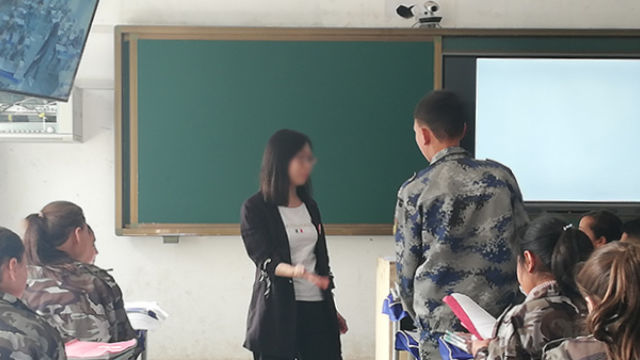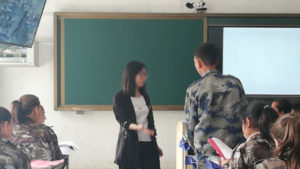Educating Uyghur Children in Xinjiang: Han Teacher’s Experience

Bitter Winter, 28 July 2019
 By Xiang Yi The CCP has been implementing a comprehensive plan to assimilate Uyghur Muslims in Xinjiang by destructing their culture and traditions. To ensure that the next generation of Uyghurs receives “sinicized” education from an early age and grows to support the Communist regime unconditionally, the authorities have been enforcing Han culture on the Muslim minority and eliminating the teaching of the Uyghur language for years. Uygur and other Turkic families were encouraged to send their children for secondary education outside Xinjiang. Gradually, Uyghur schools were asked to teach all subjects in Mandarin.
By Xiang Yi The CCP has been implementing a comprehensive plan to assimilate Uyghur Muslims in Xinjiang by destructing their culture and traditions. To ensure that the next generation of Uyghurs receives “sinicized” education from an early age and grows to support the Communist regime unconditionally, the authorities have been enforcing Han culture on the Muslim minority and eliminating the teaching of the Uyghur language for years. Uygur and other Turkic families were encouraged to send their children for secondary education outside Xinjiang. Gradually, Uyghur schools were asked to teach all subjects in Mandarin.
Since 2017, the CCP has launched a large-scale recruitment drive for primary and secondary school teachers from inland provinces to relocate to Xinjiang.
Southern Xinjiang is home to the majority of the Uyghur population of China. It is also the area where transformation through education camps are highly concentrated. In 2019, 5,498 teachers from outside the region have been hired to work in its four prefectures – Aksu, Hotan, Kashi (Kashgar), and Kizilsu Kyrgyz Autonomous Prefecture. The number accounts for 62 percent of total recruits by the Department of Education of the Xinjiang Uyghur Autonomous Region in 2019.
By the end of last year, in Kashi prefecture alone, 11,917 teachers were recruited to “further strengthen Mandarin Chinese education.” Kashi’s Shufu county has independently hired 780 Mandarin teachers from across China, with the principle qualification for recruitment as “being of good political caliber, loving the motherland, and supporting the Party’s path, principles, and policies.”
In Hotan prefecture’s Pishan county, 1,000 teachers have been recruited so far this year. While Lop county, which has over ten so-called Loving Heart nurseries and nine kindergartens for the children of arrested Uyghur Muslims, has additionally recruited 410 primary and secondary school, as well as kindergarten teachers from inland China.
Many teachers who have agreed to work in Xinjiang started regretting their decision as soon as they arrived. They not only felt deceived by the state because the conditions were not as promised. More importantly, the teachers felt controlled and monitored at all times, both at work and during their free time.
One of the recruited educational-support teachers who fled Xinjiang told Bitter Winterabout her ordeal. She asked to remain anonymous out of fear of being persecuted by the CCP.
Broken promises: indoctrination instead of perks
In 2017, the young woman saw a government recruitment notice advertising teaching positions in Xinjiang for a monthly salary of more than 5,000 RMB (about $ 730), with a possibility of tenure after three months. Reimbursement of roundtrip airfare was also promised. Such generous conditions attracted her and a few of her friends to sign up to go to Xinjiang.
When they first arrived in Xinjiang, the county mayor held a welcome banquet and encouraged them to work hard and settle down in the region. About three months later, everything started to change: their monthly salary plummeted to 3,000 RMB (about $ 430), and their plane tickets were yet to be reimbursed. On top of that, they were required to pay 500 RMB (about $ 70) every month for “poverty alleviation.” As it turned out, the money was used for the children of parents who have been locked up in transformation through education camps. With a limited salary, the young teachers were barely able to survive.
The most painful and depressing thing for the young woman was the government’s tight control. The school held political meetings every day and forced the teachers to memorize and recite national policies and Xi Jinping’s speeches. This was primarily done to prepare for inspection teams that could visit the school at any time. If teachers couldn’t answer the inspection team’s questions, they were deemed as having low “ideological awareness” and were punished accordingly.
“You could be arrested just for incorrectly uttering one sentence. We didn’t dare to say that there was something wrong in the school or allude that the Party leadership wasn’t always right. All we could do was obey. Some teachers were arrested simply for using their cellphones to take photos of patrol cars,” the woman remembered how she felt in Xinjiang. The pervasive surveillance and constant control of any communication only added to the feeling of unease. If it was discovered that anyone said something inconsistent with “Xi Jinping Thought,” they could be arrested at any time.
“Even the school leaders’ phone were under surveillance. During my time teaching in Xinjiang, several of the school’s directors and senior administrators were arrested for saying something wrong,” the teacher remembered. “However, no one dared to vouch for them, because they would be labeled as a “two-faced person” and would also be detained for ‘ideological transformation.’ No one dares to speak casually out of fear of making a mistake and being arrested. Even when talking to my mom on the phone, I wouldn’t say more than greeting words and a few general things. I felt so repressed every day that I felt like I couldn’t even breathe.”
Most children’s parents detained in camps
The young teacher felt sorry for her students. “Most of the children there have only one parent: for 80 out of every 100 children, one of the parents has been arrested, mostly fathers. Some have both their father and mother detained,” she explained.
To prevent teachers from leaving Xinjiang, the government withheld their qualification certificates, diplomas, and other documents, claiming that they are kept “for review.” This made the young teacher feel even more uncomfortable. She told Bitter Winterthat a few of her colleagues previously wanted to return home and asked for their diplomas back from the Department of Education, but were branded as having “reactionary tendencies” and were arrested.
She also went to the Department of Education several times to regain her documents but was rejected every time. With some maneuvering, she managed to get her papers back eventually. “Even if I didn’t get the relevant teacher qualification certificate and my teaching work in Xinjiang isn’t recognized after returning to inland China, I still wanted to leave Xinjiang to escape from the government’s control,” she said.
Educating Uyghur Children in Xinjiang: Han Teacher’s Experience

